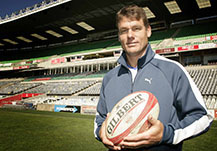 |
Michael Horak.
Photo: Johan Roux
16 October 2012 |
Mr Michael Horak has been appointed for a three year term by the UFS as Director: KovsieRugby. He began working at the university on 1 October 2012.
Mr Horak’s involvement in and experience of Super Rugby coaching, his working relationship with the Free State Rugby Union, his understanding of coaching structures and systems, as well as his knowledge of Kovsie players and present structures made him the obvious choice. He is also well positioned to see to it that the Shimlas are prepared for the next Varsity Cup tournament, which begins in February 2013.
His career includes the position of General Manager of the Cheetahs and Rugby Affairs at the Free State Rugby Union, a defence coach in Super Rugby, as well as senior Currie Cup teams and a rugby consultant for Grey College and Windhoek Gymnasium.
Some of his responsibilities as Director of KovsieRugby include the coaching of the Shimlas (head coach); the planning, development, management and implementation of a coordinated coaching and rugby programme throughout all sections of the UFS Rugby club; the development and implementation of innovative coaching techniques and methods in regards to players; as well as the development and implementation of a medium and long term strategy for the recruitment and retention of players that will be approved by the university to make success possible.
On his vision for rugby at the UFS, Mr Horak says: “It is a great privilege for me to be involved with KovsieRugby. Good work was done by Mr Jaco Swanepoel that I would like to take further to give players the best chance to be successful. Winning is what it is about and I am really looking forward to the challenges that lie ahead for all of us. My coaching team of Quintin Kruger, Hendro Scholtz and Barry Goodes is incredibly motivated to serve Shimlas rugby and to achieve success. We hope that everybody will support us and we are looking forward to seeing everybody at Shimla Park when the Shimlas win!”